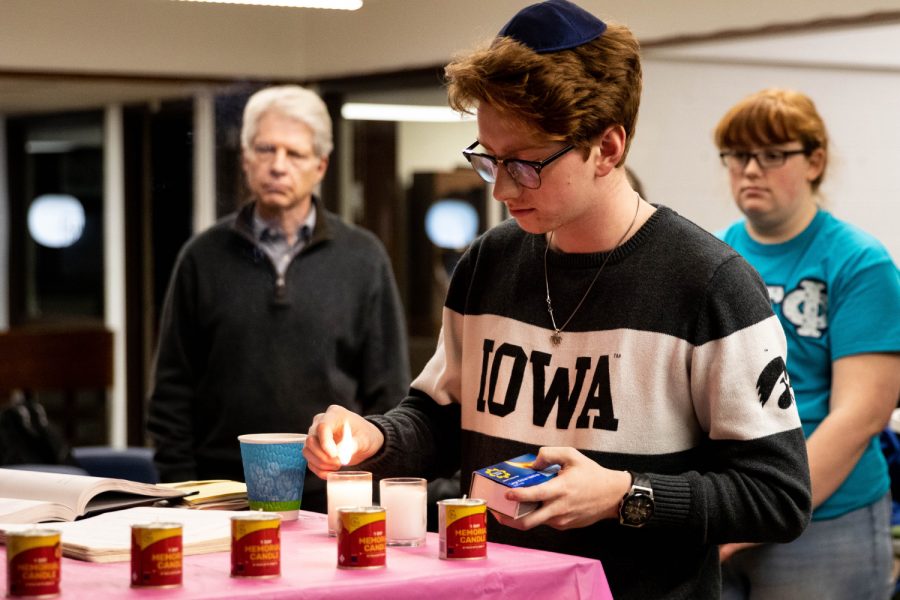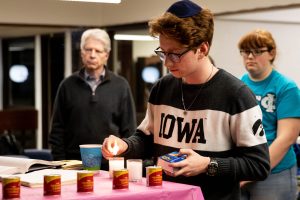Iowa Hillel holds vigil in remembrance of the Holocaust and its victims
75 years after the liberation of the Auschwitz death camp, members of the Iowa City community gather to remember the Holocaust and the impact it left on millions.
Caleb Marx lights a candle during a Holocaust Remembrance Day vigil at Iowa Hillel on Monday January 27, 2020.
January 27, 2020
In the middle of the Iowa Hillel building, 11 unlit candles stood on a table. A few were marked with the Star of David, boldly stating “NEVER FORGET.”
In total, the 11 candles represented the approximate 11 million individuals who were killed during the Holocaust.
Monday night, the Iowa Hillel hosted a candlelight vigil in honor of International Holocaust Remembrance Day. The date commemorates when the Auschwitz concentration camp was liberated, celebrating its 75th anniversary.
Ashley Carol-Fingerhut, the executive director of Iowa Hillel, began the event by giving a speech. She shared how she read the book Night by Elie Wiesel, a story detailing the author’s true experiences surviving the Holocaust with his father. She said its message struck her, emphasizing how people should never sit back while these atrocities continue to occur.
“Hearing his very human experience, having this happen and how horrible it was and all the choices he had to make … it’s just disgusting and horrifying,” she said, referencing the book.
After a moment of silence and Carol-Fingerhut reading a quote from Wiesel, the candle lighting commenced. Caleb Marx, the president of the student board for Hillel, was the first person to light a candle, which represented all of the Jewish victims.
Marx said he believes it’s important for people to further educate themselves about the Holocaust, especially by visiting concentration camps. Marx said he recently visited Auschwitz and was deeply moved by its gruesome background.
“I’ve seen all these movies, read the books, but nothing will fully empower like going to a place where millions of people were murdered and slaughtered,” Marx said. “When you go to Auschwitz, you see the shoes and where they were, you see the gas chambers where they were. It’s an incredible experience.”
Other individuals volunteered to continue lighting the remaining candles, each representing groups targeted by the Nazis, such as people with disabilities, people of color, and the LGBTQ community.
Kevin Coomer, a campus pastor at the University of Iowa, said he attended the event because it’s important that the victims’ stories are not forgotten.
“As a Christian pastor, I believe that it was a horrible affront to God, to people, and to the world,” Coomer said. “It’s something to still mourn and to learn from, I also want to identify with my Jewish brothers and sisters.”
Carol-Fingerhut said she also urges others to continue remembering the Holocaust’s impact, stating that it’s mark on history is still recent.
“If we don’t remember our past, we’re doomed to repeat it in the future,” she said. “It’s so important to keep that history alive in the sense that we shouldn’t think of it as this is something that happened so long ago that should be disregarded or moved past.”
After the event concluded, the candles continue to burn, reminding onlookers of its deeper meaning.
“At the end of the day, I think that the reason why we’re letting them last as long is because the Holocaust lasted for years and is still affecting those who went through it to this day,” Marx said. “It’s a great way to just say that the memories of the Holocaust survivors and victims are going to last forever and that even though the once the flame starts being lit, their memories will still last.”






